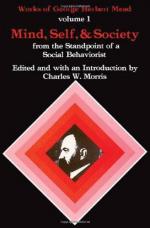|
This section contains 10,592 words (approx. 36 pages at 300 words per page) |

|
SOURCE: "Mead's Solution to the Problem of Agency," in Sociological Inquiry, Vol. 58, No. 2, Spring, 1988, pp. 139-62.
In the following essay, Baldwin investigates Mead's idea of agency, and explores his analytical method.
The thesis of this paper is that George Herbert Mead's pragmatism provides a valuable approach to the topic of agency, avoiding many of the problems that typically surround this issue. The question of agency—do human actors have autonomy and the ability to exercise free and creative choices—is at the center of several important controversies in sociology, such as the stand-off between the positivists and antipositivists, the disputes over structural and astructural theories, and the debates over action and order (Alexander 1984; Skinner 1985; Bosworth and Kreps 1986). For example, interpretive and constructionist sociologists often charge that structural and macro sociologists develop overly deterministic models that leave little or no room for human agency (Blumer 1969; Morrione 1985). But constructionist and...
|
This section contains 10,592 words (approx. 36 pages at 300 words per page) |

|


